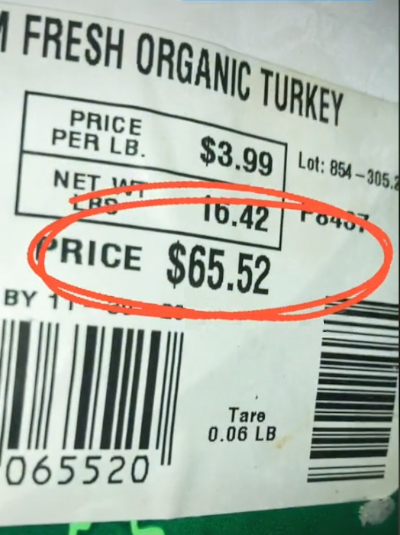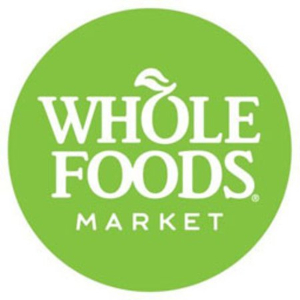I don’t usually read, much less comment on, posts by ‘professional’ bin divers – folks who make a living or supplement their diets by scrounging from the dumpsters behind supermarkets where the ‘outdated’ stuff is tossed. But I’m compelled to make an exception today…

I think I’ve discovered one reason Whole Foods charges so much for their grocery items. Both their own house brands and outside labels. After reading a recent post by a noted dumpster scrounger, I’ve come to the conclusion that they throw out so much premium food for marginal or no reason, they have to charge more for the stuff they do sell to cover the cost and support their profit margin.
What she saw
It was with wide eyes, dropped jaw and disbelief that I read the post by @dumpsterdivingfreegan (DDF) in which she recounts a midnight trip to the dumpsters behind a local Whole Foods (WF) outlet. And she came back with a mother load of still-wholesome but superannuated foods.
Among her culls: A whole turkey priced at $3.99 lb. / $8.77 kg with a total sticker price of $65.52; vacuum-packed and still-frozen meats under its own label and Beyond Foods’; soups and bottled sauces; pre-cut, pre-mixed salads and fruits; yogurt beverages, and more.
What the hey?
‘Hey’ is not exactly the word DDF used: “WTF is this?: This should not be happening. They have all things in place for donation local to them.”
I agree. It seems they just can’t be bothered to arrange the donations. To make the phone call to their local food bank or shelter saying, “Come and get it!” Perhaps WF doesn’t know that the Best Before date on a food item is just an indication that it may no longer be at its peak of freshness after that. But it’s still safe and, in most cases, satisfying to eat. It’s the Expiry Date you have to be aware of. That’s a totally different thing.
But I suspect that Whole Foods is concerned that their ‘discerning’ customers may not know the difference, and would be shocked to find stuff offered for their delectation which were beyond their ‘Best’ date. Why, those highfalutin folks might even stop shopping there…
Another example of incredible waste
I was drawn to another video on the first page of DDF’s postings list which examined thrown out but still perfectly good Advent Calendars. Not ordinary ones with candies or chocolates, mind you: cases with what appear to be piccolos of different wines, one for each day of Advent. Why were they tossed? Advent had started and they were ‘too old to sell’!
A profitable business?
Dumpster diving can be a profitable business. DDF has several posts in which she talks about donating stuff she, herself won’t use, but which is still perfectly good. She has also post one vid specifically detailing how stuff retrieved from dumpsters can be converted to cash. She takes it to flea markets.
Some caveats, there: Even if the stuff has been ‘thrown out’, it may still, legally, be the property of the store. Or, as under some waste removal agreements, it may legally be the property of the waste collector once in the dumpster. I know that, in at least three cities where I lived over my career in broadcasting, scroungers were warned not to pick up bottles with a refund value, or cans which the city could sell as aluminum scrap. ‘Once at the curb, they are the property of the City!” a news release here in my current home place proclaimed. “Violators will be subject to prosecution.”
My take
To some intrepid nighthawks, dumpster diving may have a certain adventurous appeal. But the first thing I thought of was, I’d have to be several decades younger and more athletic than I am now, and I’d have to not mind the obvious drawbacks: smells, slimy stuff that deserved to be tossed, and so on. And I’ve become something of a cleanliness freak in the wake of the COVID-19 sanitation protocols. I’m not sure even heavy welding gloves would be thick enough to separate my fingers from the crap to a degree I’d find comfortable.
That aside, I don’t think I could face up to ‘customers’ at a flea market who asked where I got my wares. I wouldn’t lie, and they, subsequently, probably wouldn’t buy. There’s a stigma – to me, at least – about anything that is one person’s trash: it’s not likely to strike me as treasure. At least not when it comes to potables. I have rescued, from neighbours’ garbage, a pair of lovely wooden kitchen stools and a limited-edition lithograph of a painting by a well-known artist – a picture that later appeared on a commemorative postage stamp!
What does concern me
… Is the waste that operations like Whole Foods perpetrate when they cull goods – particularly food items – simply because the Best Before Date has arrived or is near. It’s not about wholesomeness, much less food safety. It’s a matter of appearances and social politics. Marketing pressure makes growers cull imperfect and ‘ugly’ produce before delivery to the wholesale distributor, and the wholesaler does it’s own cull before delivering produce to the supermarket. A huge amount of fresh food is wasted before you even get to see it.
There’s a sort of intangible involved at the supermarket level; produce managers must think that, if they display less-than-perfect goods, customers will feel the store’s wares aren’t worth the prices they put on them. Or imperfectly educated customers will think the store is selling second-rate goods. It’s like an intricate dance in which retailers try to come as close to their customers other as possible – without actually touching.
Specifically in reference to high-end stores like WF, the notion of discounting items at or near their Best dates must be totally unacceptable in the context of the stores’ glossy images.
Damned of they do, damned if they don’t
All of which is not to say that WF’s business model is not designed to provide high-end goods at premium prices, and must include an allowance for what they toss. But to toss perfectly good food is a social crime – especially when it results in higher prices for the stuff that does get sold. WF’s policy is just a more-elevated version of the regular supermarket rule (also built into their business plans) of culling ugly or overripe or nicked produce to present an image of perfection, subtly justifying the prices it charges. But don’t get me wrong. There’s a high cost to acquiring fresh produce, especially when it’s out of season. And the supermarkets are operating on generally thin margins. So, they’re damned if they do cull, and damned if they don’t…
There’s a way to save much of the food that farmers, distributors and supermarkets toss. But no protocol or organization is yet in place, on a wide scale, to do so. As consumers, we can encourage those with the power – the supply chain members we’ve been talking about – to get involved with community-based efforts.
~ Maggie J.

